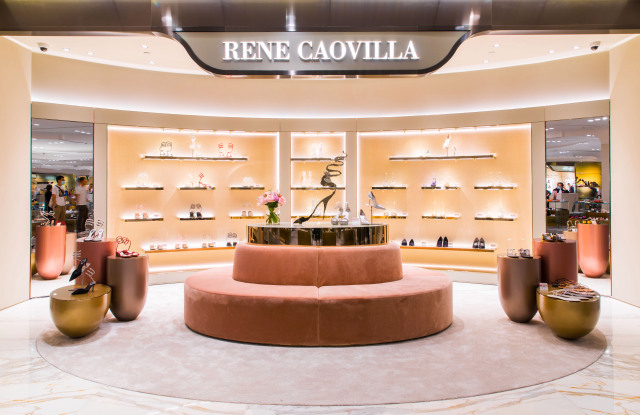René Caovilla Makes Retail Investments in China – WWD
Edoardo Caovilla, creative director and chief executive officer of the René Caovilla brand, started traveling to China in 1992, speaks a bit of Chinese and also held for two years the role of chief financial officer of the Italy China Foundation.
However, the luxury firm he leads as a member of the third generation in the Italian family who founded the brand in the Twenties in Venice, is entering China with direct distribution only now. It’s not that Caovilla didn’t pay enough attention to that market. On the contrary, knowing China very well, he wanted the company to be ready for this big step.
“In the past five years China enabled big brands to make incredible results, but it’s very different to approach that market as a large player or a smaller brand,” Caovilla explained. “Over the past few years we worked hard to create a solid balance among the different geographic areas where we are present, we gave a big push to e-commerce and as part of our growing path we created the right competences to be finally ready to enter the Chinese market in a significant way.”
Three weeks ago René Caovilla opened its first store at Beijing’s SKP luxury department store and a pop-up shop is scheduled to be inaugurated at the beginning of December in Shanghai at Plaza 66. In addition, a week ago, the luxury footwear brand launched its directly operated e-commerce site on Alibaba’s Tmall.
“China is destined to become our fifth region, after the Americas, Europe and the Middle East, Far East and online,” said Caovilla, who sees huge potential in the Chinese market. “Think that the luxury business, especially in Europe, relies on Chinese tourists, but don’t forget that now only 5 percent of Chinese people have a passport.”

Edoardo Caovilla
Courtesy of René Caovilla
With an average local customer aged between 16 and 30 years, Caovilla is trying to appeal to its Chinese clientele with a unique and special product offering. “In China, uniqueness is highly valued and thanks to the creativity of our company and our extremely flexible manufacturing organization we can really try to meet their desire for products that cannot be found in other places,” Caovilla explained.
Especially in Europe, but also in the Americas where final customers are a bit younger than in the Continent, Caovilla sells to both mothers and daughters. “We are very proud of this. Of course, it’s a challenge every season because you have to meet the expectations of different types of women with different needs, but it’s exciting,” Caovlla said.
Across the Chinese market, sandals are the most demanded René Caovilla products, but the company, through the pop-up in Shanghai, will also put the focus on its reinterpretation of the biker boot, always enriched with the brand’s signature snake symbol.
China currently accounts for 5 percent of the brand’s sales, but according to Caovilla, the market has the potential to grow to account for 20 percent of the business within three years. “Our final goal is to reach a perfect balance among all the regions,” he explained.
Even if Caovilla described the current moment as “tricky and challenging,” the company continues to also invest in the United States, where it recently opened a warehouse in New Jersey serving the brand’s American online store. At the end of 2018 the luxury shoe firm opened a boutique at Las Vegas’ Wynn Hotel, which according to the executive “is performing better than expected in this peculiar moment,” and at the end of this month René Caovilla will inaugurate a store at Miami’s luxury shopping center Bal Harbour Shops. Another unit is expected to open in Scottsdale, Ariz., at new retail development The Palmeraie Shops between the end of 2021 and the beginning of 2022.
“Currently, I think that there only four or five locations where it makes sense to be present with stores in the United States,” said Caovilla, noting how the current crisis accelerated the retail decline in cities like New York and Los Angeles, which are becoming less relevant as luxury shopping destinations. “I think that the areas in the States which are more appealing now are those where the tech economy is proliferating.”

René Caovilla signature Cleo sandal.
Courtesy of René Caovilla
While the brand’s wholesale business held up, René Caovilla’s physical retail network underperformed due to the global pandemic, especially in Europe, where retail sales are down around 40 percent compared to the same period last year. However, thanks to the positive performances of e-commerce, which partially compensated for the declines at the directly operated stores, the company expects to close the year with sales down 20 percent compared to 2019.
“Surely, a year like this doesn’t make us happy, but at the same time our business has not been hit so dramatically,” Caovilla said. “If between December and March, a vaccine will be commercialized there are good chances that the recovery across the globe will be faster.”
While Caovilla thinks that the situation in the United States will be much clearer after the presidential election, he is very positive about Chinese revenge shopping, both domestic and in nearby countries, including Japan. “Between 300 and 400 flights a week have been reintroduced to connect China and Japan,” Caovilla said. “Regarding Europe, local shoppers don’t show great propensity for luxury purchases, so we hope that American and Asian tourists will be back soon.”


